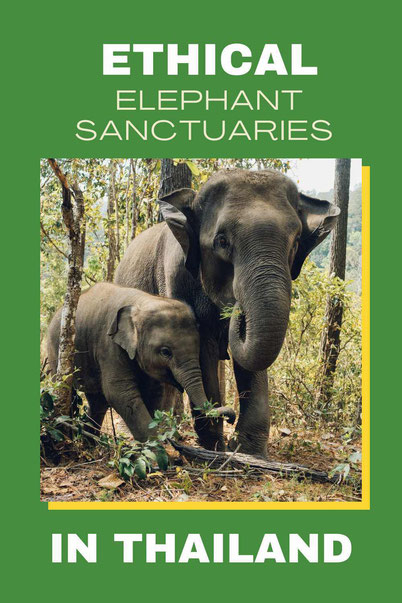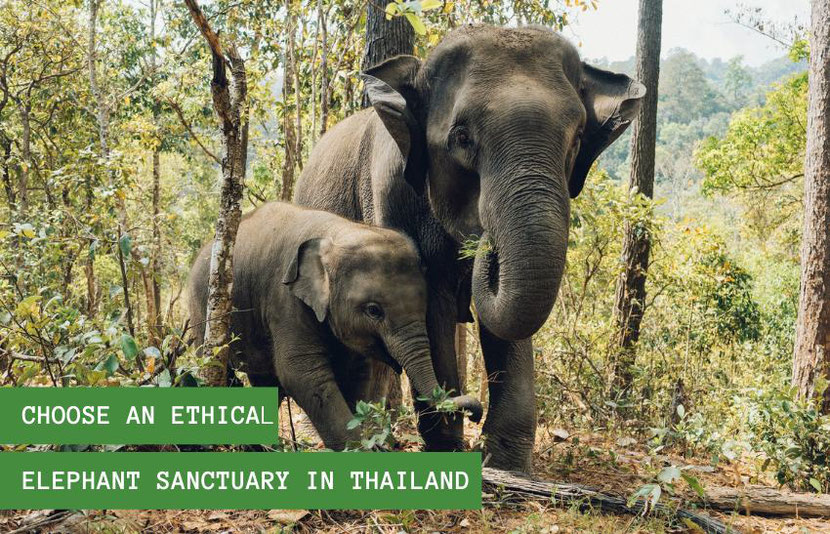
If you travel to Thailand, you have to see an elephant; it's a must-do and an experience of a lifetime. Thailand has made the elephant its national symbol and is home to about 3,500 domesticated and 3,340 wild elephants. But here is a problem: not all elephant encounters that are offered to tourists are ethical.
You may accidentally support animal cruelty without even realizing it, as I once did.
Thailand has hundreds of elephant parks scattered throughout the country. There are elephant parks where elephants are mistreated and hurt to perform tricks and carry tourists. There are also parks called "eco-friendly," "ethical," or "sanctuary," but in reality, they are not and just use these words for marketing purposes. Finally, Thailand has some truly ethical elephant sanctuaries that treat animals with respect, care for the elephants properly, and don't offer unethical elephant experiences.
Often, an unprepared traveler cannot differentiate one type of elephant park from another. I faced this myself, and now I regret that I took part in unethical elephant tours. In this article, I
want to share my ethical and unethical elephant experiences and help you choose a genuinely ethical elephant sanctuary in Thailand.
My confession: I am ashamed, but I rode an elephant and went to elephant shows and circuses in Thailand.
I traveled to Thailand for the first time in 2013 with one of the major European tour operators.
In two weeks, we visited half of Thailand from Bangkok to Chiang Mai. I was looking forward to arriving in Chiang Mai because there we had an elephant encounter in the program. As I love and admire elephants since childhood, the purpose of my trip to Thailand was to see elephants not behind bars in a zoo but in a more natural environment.
And finally, my dream came true: we arrived at the elephant park. I saw an elephant, many elephants!
When our guide offered me to ride an elephant, I, of course, without hesitation, agreed. I naively thought: "After all, elephants are such cute, good-natured animals. And riding an elephant seems like a real exotic experience, for which I came to Thailand!".
Yes, I rode an elephant in the jungle, like hundreds of thousands of other tourists. I am ashamed to talk about it now, but I believe it's important to admit your own mistakes and try to correct them.
After riding the elephants, our group went on an elephant show in the elephant village. I was amazed at how smart and graceful elephants were. Elephants danced, played football, stood on one leg,
and even painted pictures. After the show, the park staff offered to buy these paintings. The elephant's keeper also suggested that the girls take a photo sitting on the elephant's trunk for an
additional fee. I actually had a feeling that something was wrong; I felt some kind of moral discomfort. But I thought, "if it's allowed and popular, then it should be okay." Later I
learned that elephant shows and elephant trekking are not as harmless as they seem.
What is changing? NGOs & mass media campaigns, laws, and the rise of new ethical elephant sanctuaries

Fortunately, media coverage of elephant tourism in Thailand and other Asian countries has increased in recent years.
Animal protection NGOs have carried out numerous campaigns to inform tourists about the situation with elephant tourism. A bright campaign was the Elephanatics project "Ride A Bike - Not An Elephant," which explained how elephants are hurt physically and psychologically when tourists ride them.
An increasing number of travel companies are stopping offering elephant trekking tours, thereby increasing awareness among tourists. For example, TripAdvisor announced it would no longer sell elephant rides due to a wide-ranging change in company policy. And 250 more major travel companies such as intrepid Travel, Viator, Booking, Fodor's, G Adventures, Ritz Tours, TUI Group, Alexander + Roberts, Collette, VegVoyages followed suit and no longer sell elephant trekking.

Instagram may ban your account for posting a photo of an elephant with the hashtag #elephantride.
Although elephants are a complex, controversial topic, the Thai government steps up efforts to protect elephants. The Thai government adopted a law in the early 1900s after logging was banned to preserve wild elephants. Currently, they work on a new animal welfare law and a "National Elephant Care Master Plan" to protect domesticated elephants.
The new law would require registering every domestic elephant's birth and giving an ID card to every elephant. According to the statement of The Royal Thai Embassy in Washington, DC, "the legislation would also require mahouts working in elephant camps to obtain a license, and elephant camp owners will have to receive a permit to operate their camps from the Department of National Parks and submit to inspections. Lastly, the bill calls for establishing a national elephant committee chaired by the Ministry of Agriculture and Cooperatives permanent secretary. The committee will oversee the protection and welfare of domestic elephants."
In addition, in recent years, new ethical elephant sanctuaries have emerged in Thailand, where elephants live in proper conditions. In these sanctuaries, elephants are not forced to give rides;
they can socialize with other elephants, eat healthy food and receive veterinary care.
I have changed as a tourist, too: my next elephant encounter.

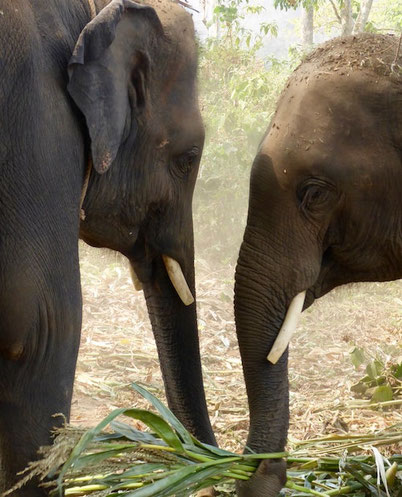
A few years later, I came to the land of smiles again in 2015. This time I was hoping to be a responsible traveler and boycotted elephant parks offering elephant trekking. I found a place where tourists could watch the elephants, walk alongside them in the jungle, feed, and bathe.
But, studying the topic more, I realized that bathing with elephants is also not ethical. It's not natural for elephants to bathe with people and too often. Elephants should not be forced to bathe when they don't want to. However, it's exactly what happens when an elephant park sells 'bathing or swimming with elephants experiences.' Bathing with tourists stresses the animal, and it's not safe for the visitors, as an elephant can get aggressive. Only a qualified elephant keeper or a trained volunteer should wash an elephant.
So, I recommend avoiding tours and companies that offer swimming with elephants, especially in the sea.

On my third trip to Thailand in 2017-2018, I visited an elephant shelter where I only observed elephants from afar and fed them bananas.
On my next journey to Thailand, I'm going to volunteer at an ethical elephant sanctuary.
I want to support a place that genuinely ethically cares for elephants and educates travelers instead of entertaining them. It looks like I finally figured out what it means to be a responsible
tourist and what is the difference between ethical and unethical elephant experiences.
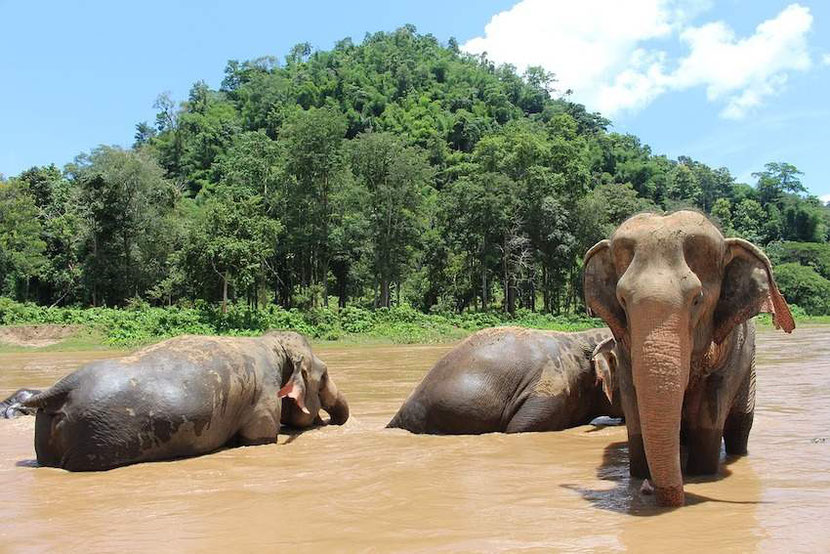
How to differentiate an ethical elephant sanctuary from an unethical elephant camp?
The words' ethical', 'sanctuary,' 'eco-friendly' are trending, but unfortunately, many elephant camps in Thailand use these words only for marketing purposes and, in fact, are not ethical or eco-friendly.
I asked Ry Emmerson from Save Elephant Foundation how travelers can know which elephant park to visit since the choice is not always obvious.
"Many elephant camps in Asia advertise themselves as a 'sanctuary,' 'rescue center' or 'retirement home,' but this does not necessarily mean that these camps have passed any type of assessment. As such, it is important to do some research by reading newspaper articles on the subject and checking independent reviews and photographs posted by visitors on various elephant tourism operators. Tourists should query tour operators on exactly what activities will be available, the maximum size of the group visiting, if bullhooks are used," said Ry Emmerson.
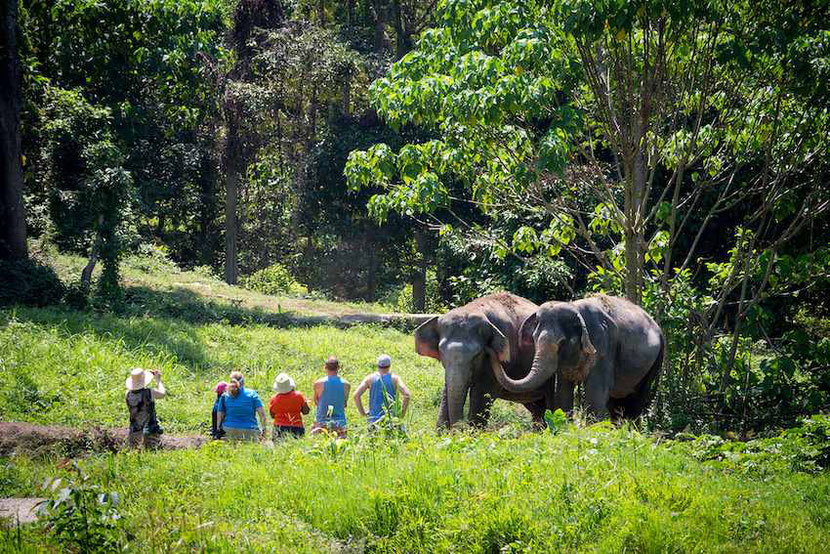
Phuket Elephant Sanctuary
I've also asked Vincent Gerards from Phuket Elephant Sanctuary to share his tips on how a tourist can distinguish ethical elephant parks from unethical ones. Here's what he advises:
“Tourists should realize that in order to engage in any unnatural behavior (such as giving rides, bathing with tourists, and performing tricks), elephants need to be trained, and this training often involves abuse.
In order to seek out truly ethical elephant experiences, we recommend tourists to ask themselves the following questions:
● What does the environment look like? Does the place try to replicate the animals' natural habitat, with enough space to roam around and bathe freely?
● Do the elephants have the opportunity to engage in natural behaviour such as scratching themselves against trees, covering themselves with mud, socialising with fellow elephants and foraging for food?
● Do shelters provide adequate space, enrichment, and opportunity to interact with other animals, free of chains and concrete floors?
● How much interaction (touching, feeding, bathing, posing for photos) between visitors and animals is offered? The less interaction, the better.
● How are animals acquired? A true sanctuary buys the animals from their previous owners and is committed to offering a final home. They don't rent or trade animals.
● What are the opening hours of the park? Ideally, there are limited public visiting hours in order to minimize the impact on the animals".
The list of verified ethical elephant sanctuaries in Thailand

To help you choose a genuinely ethical elephant sanctuary where you can meet elephants without harming them, in cooperation with the Tourism Authority of Thailand, I've compiled a list of verified elephant sanctuaries in Thailand.
Please note that this list was published in 2021.
I have received several messages from travelers that some of the elephant sanctuaries on this list chain elephants for the night. In one email, a traveler wrote that he saw tourists riding an elephant in one of the elephant sanctuaries from this list. I have no possibility of verifying whether this information is true or not. So, I suggest you use this list as a starting point, and encourage you to read recent Google and social media reviews to find out the current state of affairs at each of the sanctuaries.
1. Elephants World, Kanchanaburi
Elephants World is an Environmental Conservation Organization located in Kanchanaburi, north-west of Bangkok. It was founded in 2008 by a veterinarian Dr. Samart and is now home to over 30 elephants and 130 staff.
Elephants World's motto is "we work for the elephants, and the elephants not for us."
Elephants World offers different visiting programs: you can come for a half-day, for a whole day, or even stay there for a night in a traditional Thai style cottage near the mountains and the river Kwai. Your elephant experience will involve observing the elephants bathing, gathering or planting food for the elephants, cleaning fruits, and feeding them.
You can also participate in the Mahout Program that lasts between one to four weeks, during which you will take care of one elephant and learn everything about the Asian elephants.
2. Elephant Nature Park, Chiang Mai
Elephant Nature Park is the oldest and the most famous elephant sanctuary and a rescue center in Thailand, located 60 km away from Chiang Mai. If you are going to visit Chiang Mai, be sure to add this elephant sanctuary to your Chiang Mai itinerary. Elephant Nature Park was founded by Lek Chailert, an award-winning conservationist who has been advocating for elephants' rights and welfare in Thailand for dozens of years. She also founded the Save Elephant Foundation, an organization that fundraises for and supports elephant sanctuaries.
In the Elephant Nature Park, elephants are free to roam around the acres of land, they don't have chains on their legs, and they have access to adequate veterinary care. Moreover, this park is also home to hundreds of other rescued animals - cats, dogs, buffalos, and birds.
At Elephant Nature Park, you can get involved in different activities, from simple one-day visits to one-week volunteering projects. If you want to contribute to elephant conservation in Thailand, it's the right place to go.
3. Phuket Elephant Sanctuary, Phuket
Phuket Elephant Sanctuary is the first ethical sanctuary in Phuket and is a sister project of Elephant Nature Park. It was founded by Mr. Montri Todtane, a former Phuket elephant camp owner, and Lek Chailert. There are currently 12 retired and overworked elephants at Phuket Elephant Sanctuary rescued from elephant trekking camps. Elephants here enjoy the freedom to romp across the tropical jungle of 30 acres.
Apart from daily visits, Phuket Elephant Sanctuary offers volunteering programs. Over the past 4 years, around 1,000 volunteers participated in 1 to 7-day programs. The volunteering work can be physically challenging at times; however, it is definitely doable for anyone motivated to help elephants in Thailand and support an ethical elephant sanctuary.
4. Burm and Emily's Elephant Sanctuary (BEES), Chiang Mai
Burm and Emily's Elephant Sanctuary (BEES) was founded in 2011 by Burm and Emily, a Thai-Australian couple passionate about elephants. It offers refuge to old, injured, or retired elephants.
BEES practices a 'no contact, hands-off' policy that allows elephants to be elephants and behave naturally. It means they don't offer bathing, riding, or performances here.
However, on your visit, you can observe the elephants in the forest, take care of animals, prepare food, cut grass, or clean elephant areas.
5. Elephant Haven, Kanchanaburi
Elephant Haven is an elephant sanctuary in Thailand with a special story and a project supported by Save Elephant Foundation. It used to be Sai Yoke Elephant Camp, a typical elephant camp that kept elephants in chains and offered elephant rides. But the camp went through a transformation thanks to a collaboration with Lek Chailert, who encouraged the park to become ‘saddle off.’
Now, Elephant Haven belongs to the most ethical places for an elephant encounter in Thailand. Elephants don’t wear chains any more; they roam freely in the lush greenery, bathe in the river Kwai and play in the mud. It’s a great place to visit if you want to support the idea of elephant camps transitioning to truly ethical elephant sanctuaries. It’s possible to come here on a day visit or to stay overnight.
6. Friends of the Asian Elephant Hospital, Lampang
Friends of the Asian Elephant (FAE) Hospital is the world’s first elephant hospital located in MaeYao National Reserve, Lampang. Over 5,000 sick & injured elephants got treatment there since 1993. The hospital provides free medical care for ill and injured elephants. It also runs education programs for elephant keepers.
An important part of hospital activities is their Mobile Vets Project that treats sick elephants in different parts of Thailand.
You can visit the FAE hospital and volunteer there.
7. Kindred Spirit Elephant Sanctuary, Chiang Mai
Kindred Spirit Elephant Sanctuary is a small elephant sanctuary in the Sankampaeng district of Chiang Mai province. Kindred Spirit Elephant Foundation runs it since 2016.
They do not promote elephant rides and performances. Instead, they educate the public and the locals about elephant treatment, try to combat illegal trade, and strive to improve elephant welfare.
Kindred Spirit Elephant Sanctuary won the Responsible Thailand Community Based Tourism Award and has been commended by The World Responsible Tourism Animal Welfare Award and Thailand Green Excellence Animal Welfare Award.
The sanctuary offers short visits that last two or three days and more extended volunteering programs. Here you will have an opportunity to live in a Thai family as part of homestay, immerse yourself in hill tribe culture, learn about elephants and develop different skills such as Thai cooking or basket weaving.
8. The Surin Project, Baan Tha Klang, Surin
The Surin Project is run by Save Elephant Foundation in cooperation with the Surin Provincial Administrative Organization. It is located in Baan Tha Klang, northeast Thailand.
The Surin Project is different from other elephant parks or sanctuaries: it does not own or buy elephants.
Instead, it provides education and employment to elephant keepers and appropriate living conditions for their elephants. For the Surin Project, the Surin government set aside 2,000 acres of land for elephants and their mahouts. This project helps keep mahouts and their elephants off Bangkok or Pattaya's streets, begging or engaging in unethical elephant experiences.
Its aim is to develop responsible elephant tourism in the Surin Elephant Study Centre, where currently 200 mahouts and elephants live. To see the elephants at The Surin Project, you have to apply as a volunteer. The minimum volunteering period is one week. Please note that this great initiative is still in the process of implementation. Some elephants at the Elephant Study Center can even be chained or used in other elephant tourism forms. The Surin Project can only support up to 12 elephants at a time. Read more details about the successes and challenges of transitioning to ethical elephant tourism on the Surin Project website.
9. Elephant Hills, Khao Sok
Elephant Hills is an elephant sanctuary in Thailand, Khao Sok National Park, that became home to elephants previously working in the logging industry. It used to sell elephant rides but banned it back in 2010. They strive to provide the best living conditions for the elephants and now offer only ethical elephant experiences.
The Elephant hills park was awarded the Thailand Green Excellence Award for Animal Welfare in 2014, 2015, 2016, and 2017 and successfully passed an audit by Global Spirit, an independent animal welfare company.
At Elephant hills, you can have a much more enriching experience than an elephant ride. You can spend more time with elephants, observe them playing in the mud pool, bathing, preparing food for the elephants, and feeding them. This experience helps you understand these animals, admire them, and give something to them, instead of just taking, like in some unethical elephant camps.
Moreover, you can also stay overnight at their two glamping camps - luxury tents in the park and bungalows on the water - to fully immerse yourself in the beautiful landscapes of the Khao Sok National Park.
10. Phang Nga Elephant Park
Located on the edge of a nature reserve in beautiful Phang Nga province, Phang Nga Elephant Park is a small elephant sanctuary. It's a family-run eco-park independent of large organizations. The park looks like a typical rural Thai village, where thirty people live and work together with their elephants and families.
Phang Nga Elephant Park is committed to educating travelers. At their Education Center, you can learn about the importance of elephant conservation, the Thai elephant's history, and ethical elephant tourism, among other important subjects.
During your visit to Phang Nga Elephant Park, you can observe elephants' daily routine, help plant food, and help take care of elephants. The elephant sanctuary's founders pay important attention to a strong bond between the elephant handler - kwan chang - and their elephant. It's a crucial factor for working with elephants ethically and responsibly.
As the park is located off the beaten tourist path, it's an excellent opportunity to see rural Thailand and not-touristic areas in an exclusive way.
11. Boon Lott's Elephant Sanctuary (BLES), Sukhothai
Boon Lott Elephant Sanctuary is home to 12 elephants rescued from miserable conditions. This elephant sanctuary was founded by Katherine Connor in 2007 and named after a brave baby elephant named Boon Lott.
Boon Lot focuses on protecting elephants from abuse and helping elephants to relearn social skills. While in unethical elephant camps, elephants are usually separated from one another, at Boon Lott Elephant Sanctuary, they can rediscover their social nature and play together. It’s a perfect place to see elephants in an environment that is close to their natural habitat.
Boon Lot has several guesthouses where you can stay for a night and spend more time observing elephants taking a swim in the river, roaming around, or even get to know the mahouts. This elephant sanctuary is committed to the village community and provides jobs and housing to mahouts.
12. Samui Elephant Sanctuary, Ko Samui
Samui Elephant Sanctuary is an ethical elephant park on Samui island associated with Save Elephant Foundation. It was founded by Wittaya Sala-Ngam, who got inspiration and support from Elephant Nature Park in Chiang Mai. Samui Elephant Sanctuary is a perfect choice for tourists on Samui island who, for some reason, can’t travel to the North of Thailand to see the elephants. Here you have an opportunity to observe happy elephants who have previously been overworked in the trekking camps and the logging industry.
What can we do to help elephants in Thailand?

1. Educate yourself.
For more information on elephant abuse in Asia, visit the websites of PETA, Save Elephant Foundation, World Wildlife Fund, TRAFFIC, SAVE THE ELEPHANTS, Elephants, Elephant Family,
AnimalsAsia.
2. Choose an ethical elephant sanctuary for a visit.
Demand creates supply.
As a tourist, you vote with your dollars on how you want elephants' future to be.
Choose ethical elephant sanctuaries that don't offer elephant trekking or circus shows. And be sure to observe what methods the trainer uses when he wants to direct the elephant to some action: it should not be slaps, splinters, bullhooks, or any other infliction of pain.
Choose elephant parks where elephants live in an environment similar to their natural one. There's nothing better than seeing elephants just be elephants.
3. Don't support street begging elephants.
You should avoid giving money or buying bananas for the elephants you see on the streets of Bangkok, Pattaya, Phuket, other tourist areas, and beaches. They shouldn't be there, especially at night surrounded by loud cars and lights.
4. Say NO to unethical elephant practices.
"If it appears the activities include unethical practices, tourists have the power to say 'No' and choose a genuinely ethical operator instead. If tourists witness unethical practices while on an elephant tour, they should make others aware of this by posting reviews and using social media to get the message out," advises Ry Emmerson from Save Elephant Foundation.
5. Sign petitions.
6. Spread the word.
Photos and likes are not worth the elephants' suffering.
May all elephants be healthy and happy, and let humans be humane. Animals don't belong to us.
Share this information with your friends and social network. After all, the main reason the abusive elephant tourism continues to operate is a lack of knowledge among tourists. Travelers simply do not know the truth behind it.
You have the power to stop this abuse. Thank you.
Disclaimer: This post was written in collaboration with Tourism Authority of Thailand (TAT).
All opinions and experiences mentioned here are my own.
PIN IT:

ABOUT THE AUTHOR
Hi, nice to meet you! I'm Sasha Naslin, a founder of The Alternative Travel Guide and a world citizen at heart.
I traveled to 60+ countries on different continents and stopped counting cities after two hundred. I didn’t quit my job to travel the world. Instead, I created my job out of travel.
I help people to travel deeper, authentically and try new things. I want travel to change you in ways you never imagined.

